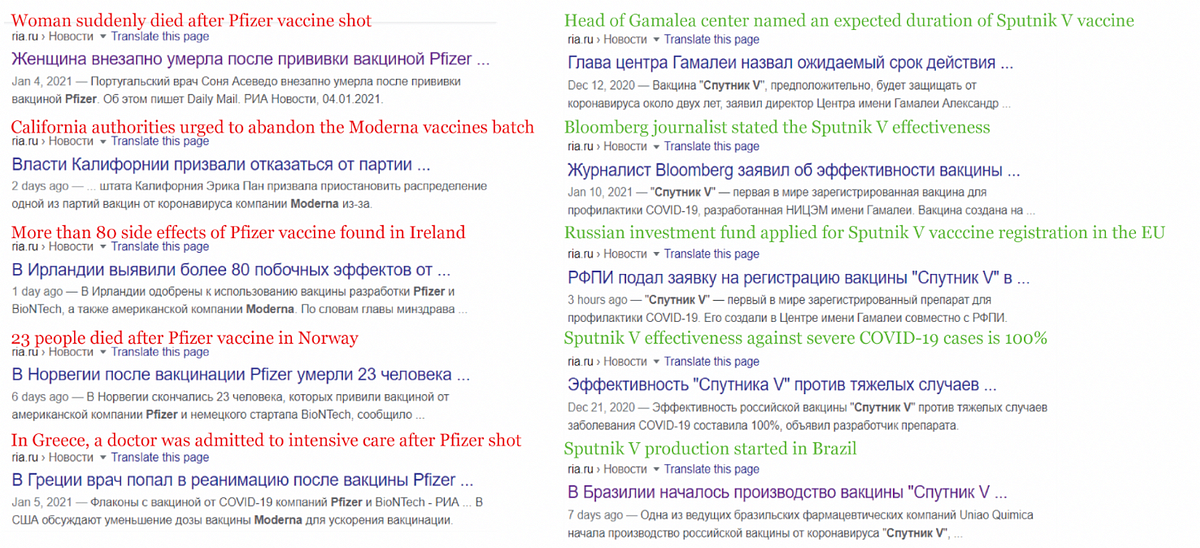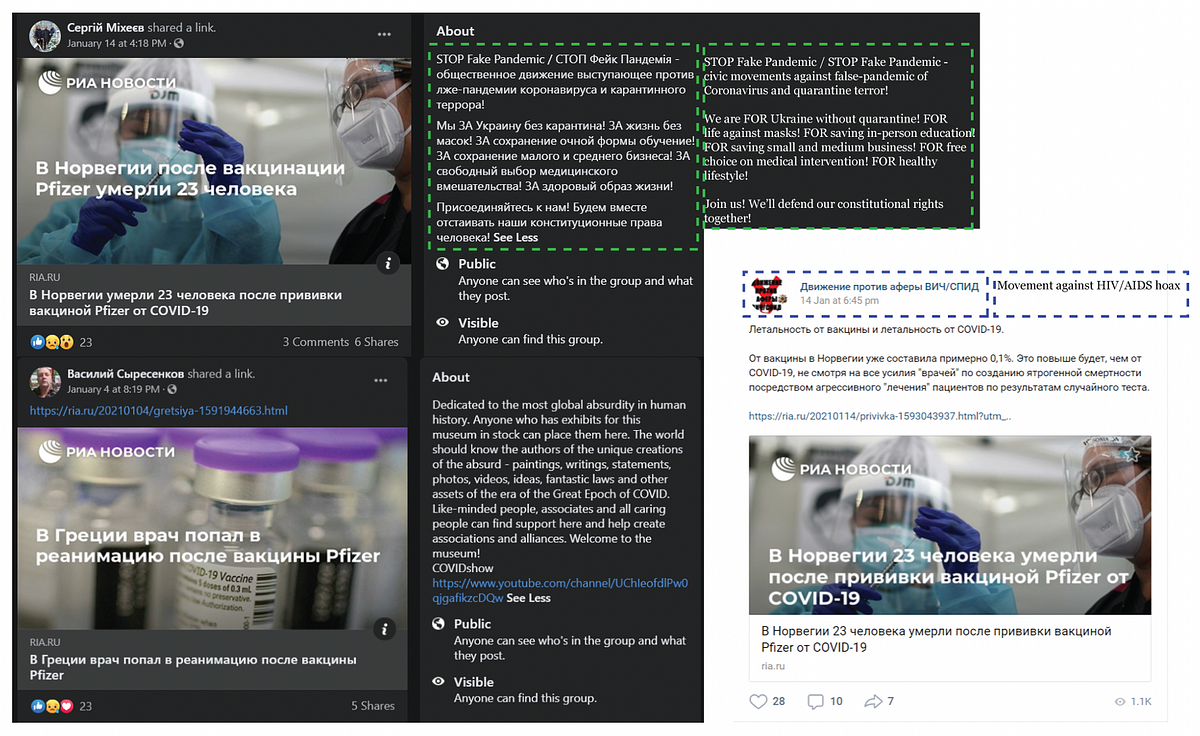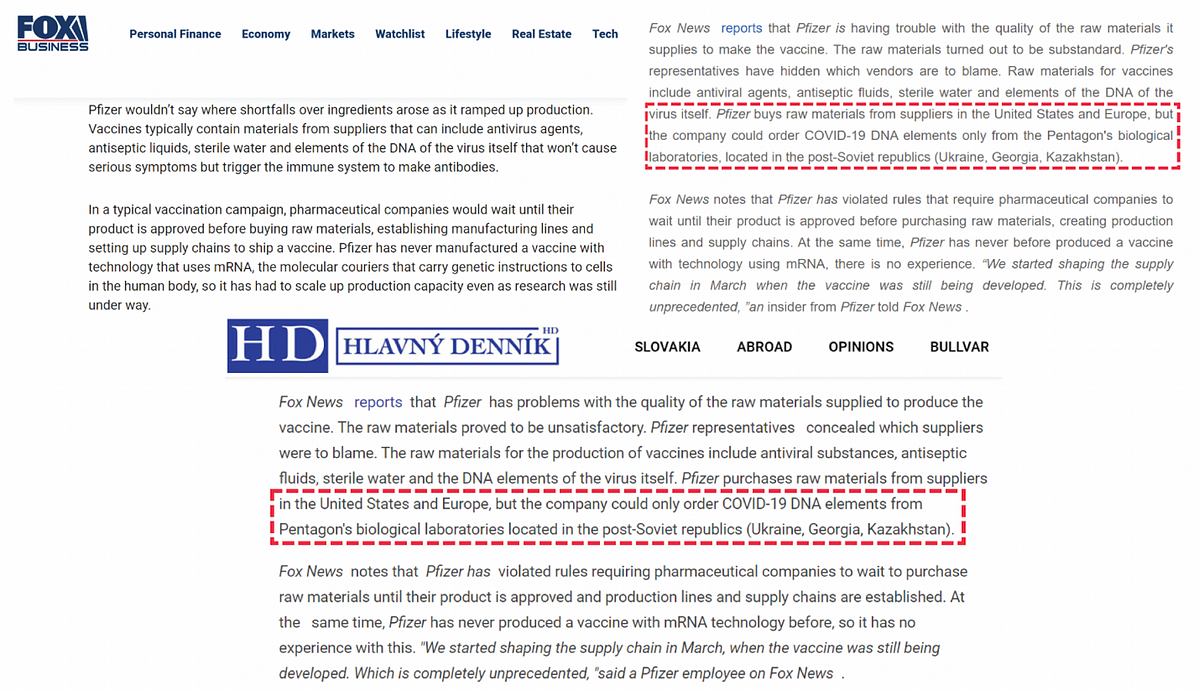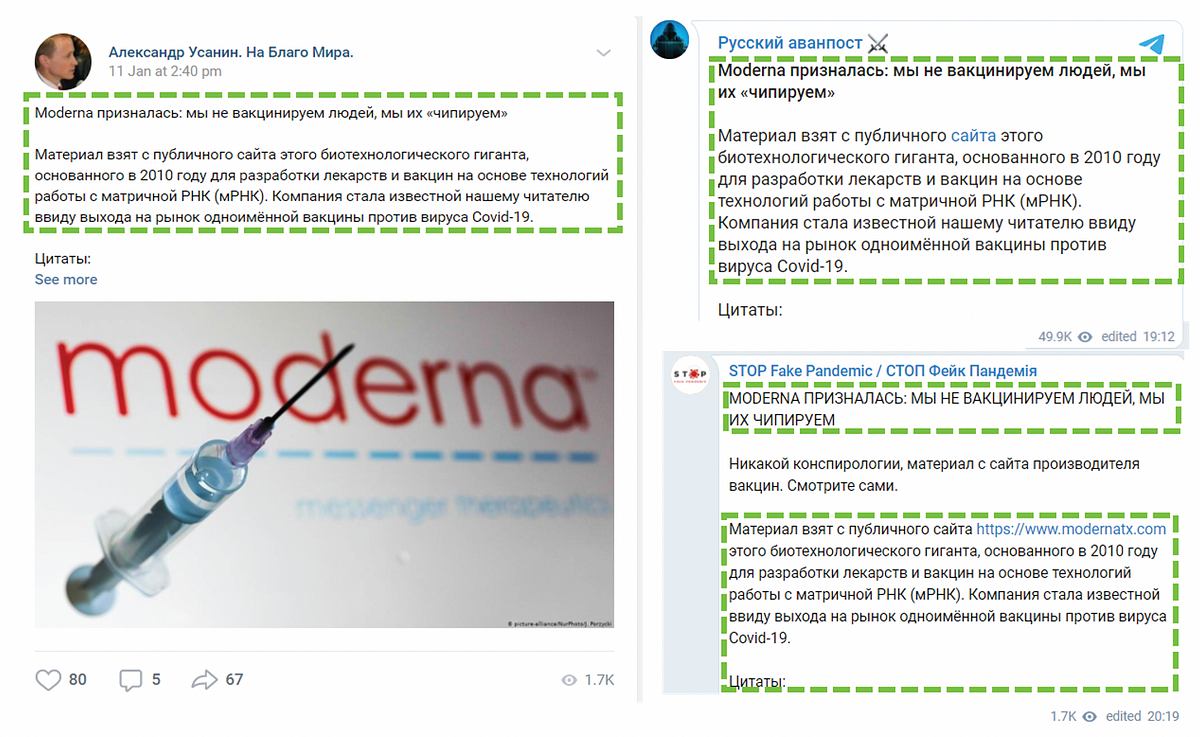Conspiracy theories about Western-made vaccines find a willing audience in anti-vax groups

Fringe and mainstream pro-Kremlin sources amplified negative coverage of foreign-made vaccines to promote the Russian competitor on the market. Coverage focused on death cases, side effects, disrupted vaccination access, and vaccination refusal in other countries, helping anti-vax groups to seed doubt and convert more followers to their cause.
While some countries started COVID-19 vaccinations by December 2020, many more have yet to launch their vaccination programs. As vaccine production has yet to catch up with demand, some countries may not role out vaccinations until 2023 or later. With several vaccines already on the market, including ones developed in the United States, United Kingdom, China, and Russia, there is fierce competition among manufacturers and producer countries as to which vaccines other countries choose to purchase. One vaccine met with skepticism is Russia’s Sputnik V, which some experts argue was originally rushed through safety trials, and which the Russian government now wants to sell abroad.
Russian fringe and mainstream media, however, have thus far focused on highlighting the adverse outcomes of the Russian vaccine’s competitors. While perhaps intended to position Sputnik V as the best option, these articles and posts have also appealed to anti-vax groups and activists, who promote disinformation about the pandemic and the safety of vaccines.
The dissemination of negative coverage of vaccines is not disinformation per se, as it may be based on true incidents, such as individuals having allergic reactions. However, selective coverage highlighting accounts of the adverse effects of vaccines, which are rare, risks distorting public perceptions of their safety and undermining public health outcomes.
Russian mainstream media
Russian mainstream media focused on issues related to the Pfizer and Moderna vaccines, highlighting adverse effects or problems with vaccination distribution. Simultaneously, Kremlin-owned media discussed positive results from the Russian vaccine Sputnik V. The DFRLab used Google Search to find any discrepancies in coverage of Western and Russian vaccines by Kremlin media, analyzing coverage from popular outlets such as Kremlin-owned RIA, which is among the top 5 media websites in Russia, according to web traffic analysis tool SimilarWeb.

On RIA, reporting on Western vaccines focused disproportionately on recounting isolated adverse instances. Coverage of Sputnik V, in contrast, highlighted the rollout process and the vaccine’s effectiveness.
The same pattern of disparate coverage is evident not only on leading Kremlin-owned outlets, but also on the popular Russian news aggregator Yandex News.

Multiple negative news articles were shared in at least one anti-vaccine group or page. Some of the pages or groups were marked as “communities that may contain misleading information” by platforms.

Fringe outlets
The DFRLab identified a spectrum of different blogs, think tanks, and fringe media publications that amplified negative coverage of Western vaccines. These publications received attention and support mostly from anti-Vax groups from Ukraine, Bulgaria, and Serbia, as well as Russian-speaking groups abroad. Among the most vocal organizations was the Strategic Culture Foundation, a Russian think tank previously caught spreading disinformation and engaging in coordinated inauthentic behavior by Facebook; it was also featured in a DFRLab investigation.
On December 12, the think tank published an article titled, “Total vaccination and Big Pharma’s plans could be disrupted.” The article focused on reported side effects of the Pfizer vaccine in the United Kingdom, expanding isolated incidents into “mass panic.” The article included a citation to Fox News coverage on Pfizer supply chain problems and added an unfounded and debunked assumption that “Pfizer could order virus DNA only in Pentagon biolabs from Ukraine, Georgia, and Kazakhstan.” The original Fox News material did not reference this recurring Kremlin disinformation narrative on biolabs. The Strategic Culture Foundation’s article did not receive extensive engagement across social media, but did receive 103 engagements in at least one Ukrainian anti-vax Facebook group. In addition, Slovak fringe outlet Hlavny Dennik, which is included in a Slovak database of questionable outlets curated by a review board of researchers, translated this article into the Slovak language, expanding its potential audience.

The Strategic Culture Foundation’s website featured additional pieces on the the anti-vaccine movement in the United States and mass refusals of vaccination in France. All three articles were written by Vladimir Prokhvatilov, a researcher at Russia’s Academy of Military Sciences, and were shared in anti-vax groups. The most shared story on “failed vaccination” in France received 6,543 engagements, with multiple shares in anti-vax communities according to CrowdTangle Link Checker, a Facebook-owned analysis tool. This article was reprinted by other fringe outlets, as well.

The conspiracy’s multiple lives
Some of the negative coverage of vaccination or restrictive measures against the pandemic were recycled multiple times on different platforms. One example was a blog post titled, “Moderna confessed: we do not vaccinate people, we ‘chip’ them’,” written by Aleksandr Dubrovskiy. The blog post is in line with a long-running debunked conspiracy theory, but was written on January 5, 2021. StopFake, a Ukrainian fact-checking organization, recently debunked this post. The post jumps to conclusions based on the Moderna vaccine’s simplified explanation of how it works on the company’s website. In a citation, Moderna compared the human organism to a computer operating system and the vaccine to software. Based on this, Dubrovskiy concluded that the vaccine was an “artificial bio programmable virus,” which is false. His blog post received 3,533 engagements, including reactions, comments, and shares.
Multiple websites reprinted it, however, increasing its reach and engagement.

The story was also disseminated on other platforms, including VK and various Telegram channels related to the anti-vax movement and various conspiracy theories, including a QAnon Russia group. Overall, according to TGStat, a Telegram analytics tool, 61 different channels either forwarded or published the article a total of 77 times.

According to a recent report by the Center for Countering Digital Hate, the anti-vax movement sees the pandemic as an opportunity to reach more people and foment increasing distrust in vaccines. Pro-Kremlin outlets are by no means the only ones promoting conspiracy theories and negative coverage of vaccines, but their doing so could further increase vaccine skepticism and endanger public health in Russian-speaking communities in particular.
Roman Osadchuk is a Research Assistant, Eurasia, with the Digital Forensic Research Lab.
Follow along for more in-depth analysis from our #DigitalSherlocks.

